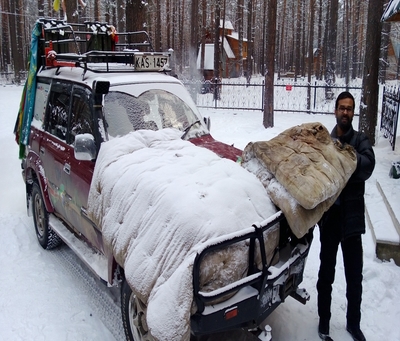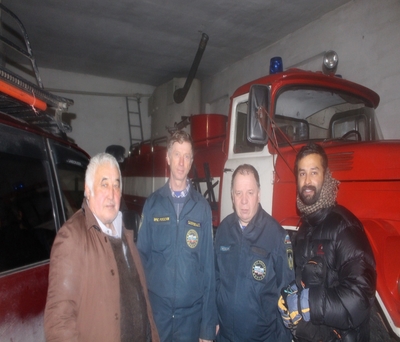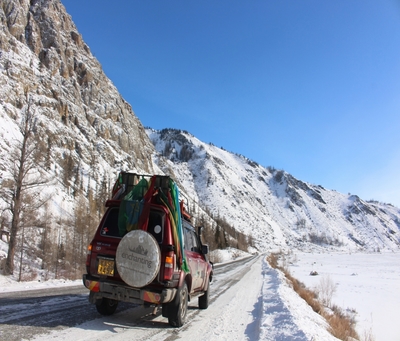
The alarm clock rudely draws me out of deep sleep, it is 2am and I need a moment to come to terms with why it is ringing in the middle of the night. Then I remember – we didn't manage to get a garage for Pele and it is my turn to get up. Over the last couple of days, we have learned a lot about how to protect Pele from the arctic temperatures during the night – adding a can of anti-freeze to the fuel, covering the bonnet with thick blankets or even mattresses, closing the exhaust with a piece of cloth, and running the engine every two hours for 20-30 minutes throughout the night. Now it is my turn to do this!
Still being half asleep, it takes a couple of minutes to get into three additional layers of clothes and then I walk out into the night. A clear sky full of stars greets me, together with a wave of incredibly cold air that takes my breath away. As I walk over to Pele and open the door, I feel a bit of anxiety – will Pele's engine start after three hours in the brutal cold? I am relieved when his engine roars confidently in the silent night. I don't want to sit inside the bitterly cold car for 20 minutes and therefore decide to go for a night walk. The soft snow under my feet swishes gently and I venture to the nearby lake which is frozen like granite. Walking and skating on the lake's ice at -30°C in the silence of the night under the stars is almost a zen-like experience …
Two "shifts" later, the first light of the day paints a faint glow in the sky to the east and the first thing I do is checking up on Pele – Hallelujah! He made it through the night!
After breakfast, we are on our way towards the Mongolian border, a journey of 500km through the stunning Altay Mountains in Southern Siberia. Today is fantastic weather, a brilliantly blue sky and a bright winter sun, and we feel in awe as we are driving along frozen rivers, past heavily snowed-in trees, through tiny villages of wooden houses and over spectacular mountain passes with the dramatic peaks of the Altay seemingly standing guard above us.
 We reach the tiny village of Aktash in darkness. Every evening, we now have an additional task – finding a shelter for Pele. The small local hotel in Aktash doesn't have a garage and so we set out looking for a place for him in the village. The village mechanics workshop is our first bet, but the owner tells us that the single space in his garage is already occupied. So we move on and knock on the door of the only house in the village that seems to have a garage but are told in a hundred incomprehensible words that there is no space. Just as this appears to turn almost into a biblical scene, we stumble across a stone house with two large garage doors and an official looking emblem. There is light from one of the windows and with a bit of hesitation we knock on it. It takes another two knocks until an elderly man opens the window. With our limited Russian vocabulary and Pele in sight, we explain to him that we are tourists and fear that the fuel in our vehicle will freeze overnight. Initially, his response is similar to the ones we encountered before – incomprehensible to us but sounding like a "No". So we do our best to look helpless and throw in a couple of "pazalsta!" ("please!") into the conversation, and eventually the man makes an audible sigh and disappears from the window. A moment later, one of the huge garage doors opens and two fire trucks come into view – this is the Aktash fire station! He beckons us to drive Pele into the garage and place it between the two ancient fire trucks. Inside it is almost cozily warm, and we are relieved to have found a warm place for Pele which also means that we don't have to get up and into the cold tonight.
We reach the tiny village of Aktash in darkness. Every evening, we now have an additional task – finding a shelter for Pele. The small local hotel in Aktash doesn't have a garage and so we set out looking for a place for him in the village. The village mechanics workshop is our first bet, but the owner tells us that the single space in his garage is already occupied. So we move on and knock on the door of the only house in the village that seems to have a garage but are told in a hundred incomprehensible words that there is no space. Just as this appears to turn almost into a biblical scene, we stumble across a stone house with two large garage doors and an official looking emblem. There is light from one of the windows and with a bit of hesitation we knock on it. It takes another two knocks until an elderly man opens the window. With our limited Russian vocabulary and Pele in sight, we explain to him that we are tourists and fear that the fuel in our vehicle will freeze overnight. Initially, his response is similar to the ones we encountered before – incomprehensible to us but sounding like a "No". So we do our best to look helpless and throw in a couple of "pazalsta!" ("please!") into the conversation, and eventually the man makes an audible sigh and disappears from the window. A moment later, one of the huge garage doors opens and two fire trucks come into view – this is the Aktash fire station! He beckons us to drive Pele into the garage and place it between the two ancient fire trucks. Inside it is almost cozily warm, and we are relieved to have found a warm place for Pele which also means that we don't have to get up and into the cold tonight.
We walk back to our hotel, a beautiful though bitterly cold stroll of about 2km under the clear night sky. The sign on the door of the café next to our hotel read 9pm as closing time and we were hopeful that we will still get something to eat there, but when we arrive there a quarter to nine, the lights are off and the door closed. So no dinner tonight! The receptionist of the hotel has mercy on us and gives us two teabags and the remains of some bread - given the circumstances we are happy with and grateful for this. Spending the night in this remote village close to the Mongolian border is a stark contrast to the Russian nightlife we sampled a couple of days ago. The flashy discotheque in the town of Biysk playing Russian pop music with muscular bouncers and the air of a Russian mafia den, and the Saturday evening in the local restaurant cum disco in a tiny village at the foot of the Altay Mountains – these are memories I will never forget!
 The next morning, we walk back the 2km to the fire station. It is fiercely cold as the sun is still behind the mountains surrounding the village and our exposed facial hair is frozen within a minute of stepping out of the hotel. Three men greet us warmly at Pele's hostel and don't let us go until they have shown us their fire station and have taken pictures with us.
The next morning, we walk back the 2km to the fire station. It is fiercely cold as the sun is still behind the mountains surrounding the village and our exposed facial hair is frozen within a minute of stepping out of the hotel. Three men greet us warmly at Pele's hostel and don't let us go until they have shown us their fire station and have taken pictures with us.
Today's journey is even more breathtaking than yesterday's – glaciated 4000 meter peaks overlook wide valleys covered in deep snow. Close to the Mongolian border the scenery turns into an almost lunar landscape. The village of Kosh-Agach means "two trees" in the local language but if they ever existed any tree here would have withered long time ago. The village conveys a strange end-of-the-world feeling, with wooden cottages petering out into endless flat steppe. Finally, we reach the Russian-Mongolian border, located on a bitterly cold mountain pass in absolute no-man's land. In spite of the extreme cold, the border staff has all the time of the world to thoroughly check our countless bags. After 3 hours we finally are through and are happy that Amgalan and Erka, our local guide and driver mechanic, are waiting for us outside the Mongolian border gate. We had arranged with them to meet us here to help us find our way through remote Western and Central Mongolia to the capital Ulaan Baatar, a journey which will take us around one week.
The road to the closest town gives us an idea of the things to come – a potholed dirt track leads to the town of Olgii which has a wild-west feel to it. We are grateful that we made it to Mongolia and we soon fall into an exhausted sleep, with images of the grandiose Altay mountains in our head and visions of adventurous days ahead.

